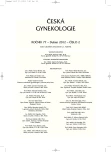-
Články
- Časopisy
- Kurzy
- Témy
- Kongresy
- Videa
- Podcasty
Urinary tract infections in pregnancy: when to treat, how to treat, and what to treat with
Authors: J. Kladenský
Authors place of work: Urologická ambulance, Dům zdraví Marty Hartlové, Brno
Published in the journal: Ceska Gynekol 2012; 77(2): 167-171
Category: Původní práce
Summary
Urinary tract infections (UTI) in pregnant women are a relatively frequent occurrence and the spectrum of these infections ranges from lower urinary tract disease (asymptomatic bacteriuria, acute cystitis) to upper urinary tract disease (acute pyelonephritis). Anatomical and functional changes in the urinary tract in pregnancy result in significantly higher susceptibility to progression of the infection from asymptomatic bacteriuria to the stage of acute pyelonephritis. Untreated asymptomatic bacteriuria in pregnancy leads, in as much as 40%, to the development of acute pyelonephritis with all the subsequent negative effects not only for the woman herself, but particularly for the fetus. Bacteriuria in pregnancy accounts for a significantly higher number of newborns with a low birth weight, low gestational age and higher neonatal mortality rate. Therefore, it is necessary to perform screening for bacteriuria in pregnant women and, when the finding is positive, to treat this bacteriuria. The selection of an appropriate antimicrobial agent to treat urinary tract infection in pregnancy is limited by the safety of a given drug not only for the woman, but particularly for the fetus. The article provides an overview of medications that can be safely used throughout the pregnancy or only in certain stages of pregnancy. The selection of an appropriate antibiotic should always be preceded by the result of urine culture. The article presents the principles and rules for treating asymptomatic bacteriuria, acute cystitis and acute pyelonephritis in pregnant women.
Key words:
pregnancy, screening, asymptomatic bacteriuria, cystitis, pyelonephritis.
Zdroje
1. Lipsky, BA. Urinary tract infections in men. Ann Intern Med, 1989, p. 138–148.
2. Kladenský, J., Pacík, D. Infekce dolních močových cest u žen. Prakt Gynek, 2001, 5, s. 43–45.
3. Patterson, TF., Andriole, VT. Detection, significance and the-rapy of bacteriuria in pregnancy. Infect Dis Clin North Am, 1997, 11, p. 593–608.
4. Grabe, M., Bishop, MC., Bjerklund-Johansen, TE., et al. Guidelines on urological infections. Pocket Guidelines, Arnhem: European Association of Urology, 2009, p. 150–166.
5. Kladenský, J., Toršová, V., Chmelařová, E. Přínos nifuratelu pro léčbu akutních nekomplikovaných uroinfekcí. Urolog praxi, 2006, 7(3), s. 109–110.
6. Hernandez-Diaz, S., Werner, MM., Walker, AM., et al. Folic acid antagonists during pregnancy and the risk of birth defects. N Engl J Med, 2000, 343, p. 1608–1614.
7. Kass, EH. Bacteriuria and pyelonefritis in pregnancy. Arch Intern Med, 1960, 105, p. 194–198.
8. Pichlíková, Y. Uroinfekce v graviditě. Postgrad Med, 2011, 13, s. 84.
9. Stenqvist, K., Ahlen-Nilsson, I., Lidin-Janson, G., et al. Bacte-riuria in pregnancy.Frequency and risk of acquisition. Am J Epidemiol, 1989, 129, p. 372–379.
10. Vercaigne, LM., Zhanel, GG. Recommended treatment of urinary tract infection in pregnancy. Ann Pharmacother, 1994, 28, p. 248–251.
11. Bartoníčková, K. Infekce močových cest a jejich léčení. Remedia, 6, 1996, s. 21–23.
12. Kladenský, J. Infekce dolních močových cest u žen – možnosti diferencovaného přístupu léčby a prevence. Urolog praxi, 2010, 11(5), s. 238.
13. Kladenský, J., Pacík, D. Nespecifické infekce dospělých. Postgraduál Med., 2000, 2, p. 139.
14. Hill, JB., Sheffield, JS., McIntire, DD., et al. Acute pyelonephritis in pregnancy. Obstet Gynecol, 2005, 105, p. 18–23.
15. Miller, LK., Cox, SM. Urinary tract infections complicating pregnancy. Infect Dis Clin North Am, 1997, 11, p. 13–26.
16. Wing, DA., Hendershott, CM., Debuque, L., et al. A randomized trial of free antibiotic regimens for the treatment of pyelonefritis in pregnancy. Obstet Gynecol, 1998, 92, p. 249–263.
Štítky
Detská gynekológia Gynekológia a pôrodníctvo Reprodukčná medicína
Článek Editorial
Článok vyšiel v časopiseČeská gynekologie
Najčítanejšie tento týždeň
2012 Číslo 2- Ne každé mimoděložní těhotenství musí končit salpingektomií
- I „pouhé“ doporučení znamená velkou pomoc. Nasměrujte své pacienty pod křídla Dobrých andělů
- Mýty a fakta ohledně doporučení v těhotenství
- Gynekologické potíže pomáhá účinně zvládat benzydamin
-
Všetky články tohto čísla
- Laparoskopicky asistovaná neoplastika pochvy podle Vecchiettiho
- Vliv aplikace GnRH analog na peroperační a postoperační výsledky myomektomie u žen v reprodukčním věku
- Kryokonzervace ovariální tkáně u onkologických pacientek – 6 let klinických zkušeností
- Vedení porodu po předchozím císařském řezu, analýza výsledků z let 2007–2010
- Triple negativní karcinom prsu – prognosticky vysoce závažná skupina mamárních malignit
- Nové metody zvyšující úspěšnost asistované reprodukce
- Kortikotropin-releasing hormon a adrenokortikotropní hormon – možné markery některých těhotenských patologií
- Imunoterapie karcinomu ovaria
- Těhotenství a porod zdravého dítěte komplikované koincidencí heterotopické gravidity po IVF a placenty perkrety s následnou hysterektomií
- Fetomaternální hemoragie při porodu císařským řezem
- Medicínské, právní a etické aspekty zachování fertility u onkologických pacientek
- Uroinfekce v graviditě – kdy léčit, jak léčit a čím léčit
- Výskyt trombofilních mutací u žen se závažnými těhotenskými komplikacemi
- Možnosti IVF v nativním cyklu
- Editorial
- Historie a současnost Gynekologicko-porodnické kliniky v Brně
- Screening v 11.–13.+6 týdnu těhotenství
- Česká gynekologie
- Archív čísel
- Aktuálne číslo
- Informácie o časopise
Najčítanejšie v tomto čísle- Triple negativní karcinom prsu – prognosticky vysoce závažná skupina mamárních malignit
- Možnosti IVF v nativním cyklu
- Uroinfekce v graviditě – kdy léčit, jak léčit a čím léčit
- Vedení porodu po předchozím císařském řezu, analýza výsledků z let 2007–2010
Prihlásenie#ADS_BOTTOM_SCRIPTS#Zabudnuté hesloZadajte e-mailovú adresu, s ktorou ste vytvárali účet. Budú Vám na ňu zasielané informácie k nastaveniu nového hesla.
- Časopisy



